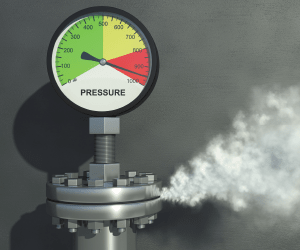
What to Do When Everything Feels Important!
March 28, 2022
5 minute ReadBY SARA ROSS
One of the most consistent questions I’ve been asked over the last 18 months is, “With so much change, how do I handle everything?”
“Everything” may include addressing staffing issues, dealing with supplier relationships or strategizing digital marketing activities down to managing the everyday stressors and frustrations that come with being a business owner, an operator and a leader of people.
Regardless of the specifics, we can all agree that what is required of people has changed and grown. And, yes, different strategies are needed to meet the increased demands you are facing today.
There is no doubt that making strategic and sound decisions requires technical expertise and business experience. Although knowledge and business acumen are vital factors, people often overlook the need to incorporate emotional data, which is at the heart of emotional intelligence (EQ). Simply put, utilizing your EQ means recognizing how your emotions influence your perspectives and leveraging that information to make better decisions.
The challenge is, people often focus on finding strategies to help them manage it all without considering if it all needs to be managed.
Clarifying what requires your time, energy and attention and what doesn’t may seem like a simple idea, but under stress distinguishing the two becomes more challenging. In fact, the more stressed you feel, especially when that stress is experienced for long periods, the more your body attempts to meet the demands by dialing up the stress response and pumping additional cortisol reserves into your system. This response primes your body and attention to stay on high alert and changes how you process information. To ensure you pay attention, your brain not only amplifies the importance and urgency of the information but also overemphasizes the potential negative outcomes if your vigilance drops.
It is tempting to see this response as your brain working against you. It isn’t. It is helping you prepare to respond, so the goal is to understand better how to work with your stress response and extract the essential information. Without leveraging your skills of EQ, the unintended consequence is that your brain struggles to apply a sense of proportionality to experiences making it difficult to distinguish meaningless and mundane events from the truly urgent and important.
Everything appears to require your immediate attention and best efforts.
This may include seeing your kids; insistence on wearing their Halloween costumes to school (even though it’s not Halloween), with the same level of importance as needing to follow up with your insurance provider to understand the changes to your businesses coverage in a time of COVID. Obviously, they are not equal, but in the moment both may elicit the same level of stress. This is where the opportunity to use your EQ skills comes into play.
The fact that you are reading this means there is a good chance it’s because your natural response is to dig in and try to do it all. Chances are even higher that this approach has left you feeling both exhausted and perpetually locked in a cycle of never-ending to-do lists.
Breaking that cycle requires acknowledging that both time and energy are finite resources. Therefore, a strategy will be most useful if it helps you regulate your energy and maximize your time. This approach is the difference between feeling like you need to manage it all and determining what needs to be managed.
The next time it feels like the world’s to-do list is smothering you, try practicing the 7×7 Rule in which you ask yourself the seven following questions:
Will this matter in: 7 years? 7 months? 7 weeks? 7 days? 7 hours? 7 minutes? 7 seconds?
Does simply asking these questions solve the problem? No.
Does it cross things off your list? No.
What it does is help you put things into perspective, differentiate the meaningful from meaningless, prioritize where to put your time, attention, and how much emotional energy to give. These questions will help to provide clarity on what to take action on first.
The “Rule” of this strategy is not to give more time or energy than the amount of time it will matter. In other words, if it won’t matter by the end of the day, don’t give it the same amount of energy and time as something that will matter seven months from now.
Your children wanting to wear their Halloween costumes probably won’t matter in seven seconds from now because chances are they aren’t the only one. Let this one go – low energy input, low time input – low emotional energy output.
Some conversations, reactions, decisions and situations – such as ensuring you have the right insurance – will have a lasting impact, so divert your best resource to those situations. This is not to say that small things shouldn’t bother you or aren’t worth reflection. They absolutely are, and you should use your emotional reactions as information to assess why that situation impacted you the way it did … and then respond in an equally measured way.
Not only is the Rule of 7×7 helpful at the moment, but it is also a skillful way to keep yourself in check while preparing for a high-pressure situation. This is especially powerful if you are a perfectionist. Sometimes good enough is good enough!
It is also a more structured way to reflect on stressful situations that have already passed, particularly if you have one of those critical brains that love to analyze your reactions to the day’s events just as your head hits the pillow.
I still don’t have the answer to how to do everything and, unfortunately, I don’t think that answer is out there. Instead, shift your question’s focus to ask yourself how to use your physical time and emotional energy the best way today.
Sara Ross is a speaker as well as the founder and Chief Vitality Officer at BrainAMPED, a leadership research and coaching firm redefining how people succeed and thrive with vitality through stress by using brain-based strategies focused on energy management, emotional intelligence, and resilience. Sara works with clients such as Microsoft, Wells Fargo, the U.S. Navy SEALs, PepsiCo, T-Mobile, as well associations, entrepreneurs, and government agencies. Learn more about Sara Ross and her work at www.sarajross.com.








